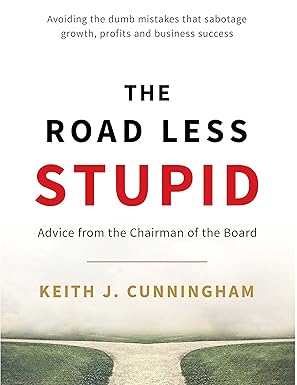The Road Less Stupid is a guide to better thinking, decision-making, and execution. By prioritizing structured reflection and avoiding common mistakes, Cunningham provides a roadmap for long-term success in business and life. The book’s practical advice is grounded in real-world experience and emphasizes that the cost of avoiding bad decisions is far less than the price of making them.
Core Premises
- Avoiding Stupid Decisions is Key: The cumulative cost of bad decisions is often greater than the effort required to avoid them.
- Thinking Time is Critical: Setting aside time to think deeply and ask the right questions leads to better decisions and fewer mistakes.
- Discipline and Simplicity Win: Consistent execution of simple, well-thought-out actions produces the best results.
Key Concepts
1. Thinking Time
- What It Is: A dedicated, distraction-free period for focused reflection to clarify priorities, solve problems, and plan effectively.
- How to Do It:
- Schedule regular thinking sessions.
- Write down clear, high-quality questions to guide your thought process.
- Reflect deeply without rushing to conclusions.
- Examples of Thinking Questions:
- “What is the downside, and how can I protect against it?”
- “What assumptions am I making, and what if they’re wrong?”
- “If this fails, why will it fail?”
2. The Cost of Stupid Decisions
- Stupid decisions often come from overconfidence, impatience, or emotional reactions.
- Avoiding poor choices requires humility, self-awareness, and clarity about long-term consequences.
- Cunningham emphasizes the idea that smart people learn from their mistakes, but wise people learn from the mistakes of others.
3. The Power of Discipline
- Success comes from consistent execution of simple, repeatable actions that align with long-term goals.
- Avoid chasing shiny objects or overcomplicating strategies. Stick to fundamentals.
- Create systems and habits that prevent you from falling into reactive, short-term thinking.
4. Financial and Business Principles
- Cash Flow is King: Focus on generating predictable, sustainable cash flow rather than chasing profit at the expense of stability.
- Leverage and Risk Management: Avoid taking on unnecessary risks or using excessive leverage that could jeopardize your business or personal finances.
- Revenue and Growth: Growth is not always good—ensure that it is profitable, sustainable, and aligned with your strategic goals.
5. The Role of Leadership
- Great leaders focus on clear communication, delegation, and accountability.
- Avoid micromanaging; instead, empower teams to take ownership of their roles.
- Continuously improve decision-making skills by learning, reflecting, and adapting.
Key Takeaways
- Think Before You Act: Most mistakes can be avoided by asking better questions and taking time to reflect.
- Protect the Downside: Always have a plan for mitigating risks.
- Focus on Simplicity: Complexity is often the enemy of execution. Stick to straightforward, actionable plans.
- Be Consistent: Success comes from disciplined, repeatable actions over time.
- Avoid Ego-Driven Decisions: Pride, overconfidence, and emotional reactions lead to poor outcomes.
Quotes from the Book
- “The key to being smart is knowing what to ignore.”
- “The best way to increase profits is to stop doing dumb things.”
- “Discipline is the shortcut.”
https://amzn.to/4dcbFoL
